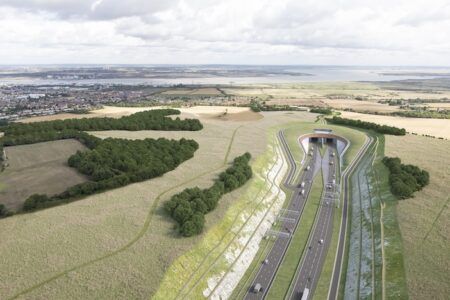With many cities around the world looking to reduce vehicle emissions and noise pollution, there is a growing need to find alternative power sources for heavy delivery trucks, in order to make them more urban- and environmentally-friendly.
Daimler Trucks, one of the world’s leading truck manufacturers, has now presented the Mercedes-Benz Urban eTruck as the first fully electric truck with an admissible total weight of up to 26 tonnes, demonstrating that in the future, heavy trucks will be able to take part in urban distribution operations with zero local emissions and hardly any noise.
Until recently, the use of fully electric drive systems in trucks seemed to be unviable, due to the high cost of the batteries required coupled with their low range. However, the technology has now become much more mature, and in particular, battery cells are rapidly developing.
Daimler expects the costs of batteries to lower by a factor of 2.5 between 1997 and 2025, from 500/kWh (US$558/kWh) down to 200/kWh (US$223/kWh). Performance will improve by the same factor over the same period, from 80Wh/kg up to 200Wh/kg. The company considers that the full market launch of this technology for urban short-radius distribution is conceivable by 2020, with ranges of up to 125 miles (200km) and a load capacity comparable with diesel-powered vehicles.
The new Urban eTruck is based on a heavy-duty, three-axle short-radius Mercedes-Benz distribution truck. However, the developers at Daimler have totally revised the drive concept. The entire conventional drivetrain has been replaced by a new electrically driven rear axle, with electric motors directly adjacent to the wheel hubs. The system was derived from the electric rear axle that was developed for the Mercedes Citaro hybrid bus. The power is supplied by a battery pack consisting of three lithium-ion battery modules, which results in a range of up to 200km enough for a typical daily delivery tour. Due to the integrated concept of the motors adjacent to the wheel hubs, the batteries are housed in a crash-proof location inside the frame.
In the light distribution sector, Daimler has already been demonstrating the day-to-day suitability of the fully electric truck in customer trials with the Fuso Canter E-Cell model. Since 2014, the Fuso-branded 6-tonne electric trucks have proved their worth in the first fleet trials in Portugal. Under widely varying operating conditions, the trucks covered more than 31,000 miles (50,000km) within one year, and in the process they were locally emission-free and, taking power generation into account, reduced CO2 emissions by 37% compared with diesel engines, with operating costs 64% lower on average.
“With the Urban eTruck, we are underlining our intention to systematically develop the electric drive in trucks to series production maturity,” said Stefan Buchner, head of Mercedes-Benz Trucks. “This means we will begin to integrate customers, so as to gain valuable joint experience with respect to the operating ranges and the charging infrastructure in daily transport operations. We think the entry of this technology into series production is already conceivable at the beginning of the next decade.”




